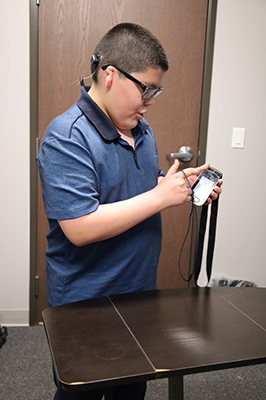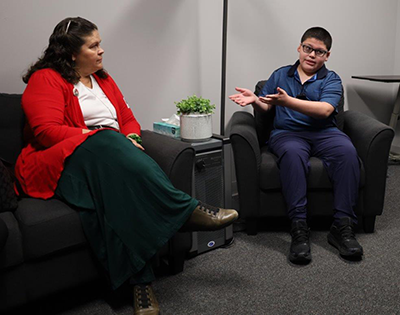Shortly after Josemaria “Chema” Romo was born, his mother, Janeth Romo, was informed that her newborn boy had a congenital disability of the right ear known as atresia/microtia which would negatively affect his hearing. After audiological testing, young Chema was diagnosed with severe to moderate conductive hearing loss in his right ear.

Mrs. Romo actively sought out solutions and was connected with the Inland Regional Center for speech therapy. When Chema was three, Mrs. Romo was introduced to Riverside County Office of Education Deaf/Hard of Hearing Itinerant Teacher, Theresa Copple.
“He came into my office with his mom and sister, and part of the initial assessment was to have fun together and play,” Mrs. Copple said, when recalling her first assessment of Chema. “I remember that he really liked Buzz Lightyear from Toy Story, and he reminded me of my own son. He was very interactive, and we made a connection right away.”
Chema had been fitted for a device that was worn as a headband to help with his hearing. As an energetic three-year old, Chema hadn’t been consistently wearing the non-surgical headband-style device that helped him compensate for his hearing loss, but his mother came up with a creative idea to convince him to wear the device.
“They convinced Chema’s younger sister to start wearing a headband in solidarity with Chema in order to normalize and influence him to wear his headband,” Mrs. Copple said. “That really launched him into wearing it during a key developmental time to build a communication foundation.”
After he started school, Mrs. Romo remembers Chema coming home at the end of the day and sharing that others were questioning him about his ear.
“I would say: ‘Chema, God made you like that, you’re special. Don’t feel bad. It’s not how you look, it’s what you have inside.’”
Throughout his education, Chema would connect with Mrs. Copple regularly to check his equipment, work on deaf/hard of hearing goals, and make sure he had everything he needed to succeed.
“She would come every month to check my equipment and would talk with me to make sure everything was good,” Chema said. “She is really helpful, and I’m very thankful for her.”
“Since he was three years old, Mrs. Copple has been a blessing in Chema’s life, our life, and has become family to us,” said Mrs. Romo.
Upgrading Chema's Technology
 When he turned 8 years old, it was time to upgrade Chema’s headband-style device. He underwent a surgical procedure to implant a magnetic style bone-anchored hearing aid, also known as a baha, near the back of his head.
When he turned 8 years old, it was time to upgrade Chema’s headband-style device. He underwent a surgical procedure to implant a magnetic style bone-anchored hearing aid, also known as a baha, near the back of his head.
Around the time of the surgery, one doctor also offered an option that included reconstruction of Chema’s ear using cartilage from his ribcage, and Chema declined.
“They would ask me: ‘Would you like to have your ear as a normal one?’, and I said ‘No. I’m not changing my ear. God made me like this. I’m special that way. I’ll stay who I am, thank you.’”
Beyond improving Chema’s hearing in a more permanent fashion, the surgical procedure allowed for technological developments to amplify the listening and learning experiences for Chema at school. Now, Chema has taken control of his own audio world by mastering the technology that maximizes his communication abilities.
“It’s hard to not have two functioning ears. So, for this technology to be here, it makes me feel like people are here for me and that they always will be,” Chema said. “It’s really nice because it helps me hear like normal.”
Chema recognizes that he can also help others with his knowledge of assistive audio technology. He recently transferred to Springs Charter School for 5th grade where he attends classes at the Magnolia Student Center with all three of his siblings.
“I am able to help kids and teachers with the equipment, what it’s called, how to handle it delicately, and to fix any problems with it,” Chema said. “I give the teachers a quick rundown on the phone app, the multimedia hub, and everything. Now, teachers can mostly connect by themselves, but they still need me for some things. They are still learning.”
When there is an interruption in the functioning of the in-classroom equipment, Chema is the first line of tech support defense.
“I told my teacher, and my mom, that they don’t have to call Mrs. Copple to fix things, I can handle it,” Chema said.
“Sometimes it’s hard to handle when people ask, ‘What’s wrong with your ear?’” My answer is that I was born with this, and it is what makes me special. Then, I can introduce them to the technology and show them all the things it can do.”
“Technology has changed our world a lot. Back then, people didn’t have these technology advancements,” Chema said. “It helps our world become better and safer.
EXPLAINING THE TECHNOLOGY
Baha
A bone-anchored hearing aid amplifies sound via bone conduction, or vibrations through the bones of the skull which directly stimulate a functioning cochlea. Rather than transmitting sound via the middle ear like a traditional hearing aid, this type of amplification does not require any part of the device to be placed in the ear canal.
Roger System
Miniature universal receiver on Chema’s person that connects with wireless microphones to provide clear access to a speaker’s voice in noise and over distance. Chema’s teachers wear a small microphone around their neck like a badge or necklace so that he can hear them. A pass-around microphone is also available for classroom discussions. A multimedia hub provides Chema with access to hear videos or other content played on classroom computers or tablets. A sound tower is also used to capture classroom sound.
Chema Selected for International Award
In the fall of 2023, Chema learned that he had been selected as one of twelve national “Yes I Can” honorees by the Council for Exceptional Children (CEC), the largest international professional organization dedicated to improving the success of children and youth with disabilities and/or gifts and talents.
Chema’s selection as a “Yes I Can” honoree, was an exciting moment in the Romo household.
“It was a regular day when I heard the news. It was late, but I was ecstatic,” Chema said. “I couldn’t understand how I had actually won this award. It was crazy to hear, and I could have never imagined it could happen to us.”
When Chema travels to San Antonio in March to receive his award at the Council for Exceptional Children Special Education Convention and Expo, he is looking forward to trying things that he hasn’t been able to try in California like restaurants and places to visit like The Alamo.
At the conference, Chema will be recognized for his expertise in technology, and will be welcomed on stage to have a conversation with the presenter and share his story in front of convention attendees from all over the world.
 “I’m very thankful for all my technology. It’s very nice that I was nominated for this award for my talents, and because of the wonderful people who have helped me,” Chema said. “I want to tell people not to hate who they are, but that you should love who you are, and that there will always be people there to help you like my mom and Theresa Copple.”
“I’m very thankful for all my technology. It’s very nice that I was nominated for this award for my talents, and because of the wonderful people who have helped me,” Chema said. “I want to tell people not to hate who they are, but that you should love who you are, and that there will always be people there to help you like my mom and Theresa Copple.”
Chema's Bright Future
At the age of 10, Chema isn’t sure what he wants to do in the future. His favorite part of school is science and history, and he loves to read and write. He also enjoys building things, LEGO, science, and forensic science.
“I want him to be successful, and I always tell him to choose a profession that he will love, is passionate about, and where he can help people,” Mrs. Romo said. “I know that wherever he goes, he’s going to do good.”
“I’m still finding out what I’m passionate about,” Chema said. “There are no cons to this. No setbacks. I’m always moving forward and I know that I can overcome any barrier I face.”